
What Are Litigation Limitation Periods And Why They Should Be Strictly Complied With
Introduction
It is imperative to think about limitation periods early in litigation, as it is an ultimate deadline prior to which you can bring a claim without it being time-barred. The purpose of limitation periods is to prevent legal claims from being brought too long after the cause of action has accrued and the length of the limitation period depends on the type of legal claim being brought.
A claim is likely to fail if the limitation period has expired, even if you have a strong case. This is why limitation periods cannot be brushed to the side and ignored. Even where there are unusual circumstances (i.e., where a party is prevented from issuing its claim for reasons beyond its control), the court has no discretion whatsoever to extend the limitation period in most types of claims. Hence, it is crucial that limitation issues are considered at the outset of any potential claims.
The time for bringing a legal claim will start to run (and the limitation period will begin) once the cause of action has accrued. In order to stop the time from running prior to the expiration of the limitation period in relation to a particular cause of action, a claim form must be issued at court or a standstill agreement must be entered into with the opponent. A standstill agreement is a way in which the limitation period time can be extended and agreed between all of the parties in the claim, prior to the expiry of the limitation period.
Practically, when a standstill agreement is in place, the action will do exactly what it says on the tin and ‘stand still’, meaning that no party to the agreement can complain or make representations to the court regarding the other party’s inactivity in the claim. The standstill agreement usually only temporarily stops the limitation time running and it can be useful to help the parties consider settlement negotiations without the issue of needing to protect the limitation position. Time and costs associated with bringing a claim are therefore avoided, but it does alert the other parties that you may actually be issuing legal proceedings.
If the limitation period expires before a claim form has been issued or a standstill agreement has been entered into, then the claim shall be time-barred. The opponent will be able to use this fact to raise a full defence to the legal claim after the limitation period has expired (notwithstanding how strong a claim it may otherwise be) and there are a number of ways in which the opponent could do this:
- apply to the court under the Civil Procedure Rules (“CPR”) to have the claim struck out on the basis that the claim discloses no cause of action;
- file and serve its defence and then seek (often at the Costs and Case Management Conference) to have the limitation period tried as a preliminary issue, with a view to obtaining summary judgment under Part 24 of the CPR; or
- allow the claim to take its ordinary course, reserving the limitation defence until the full trial.
The below tables set out the relevant limitation periods for each common litigation topic, including:
- Property Law;
- Employment Law;
- Contract Law;
- Personal Injury;
- Administrative and Public Law;
- Miscellaneous Statutory Claims;
- Actions brought under the Consumer Protection Act 1987; and
- Professional Negligence Law.
Please note that the below should only be considered as a general guideline, given that the expiry of the limitation period can vary according to the circumstances of the case at hand.
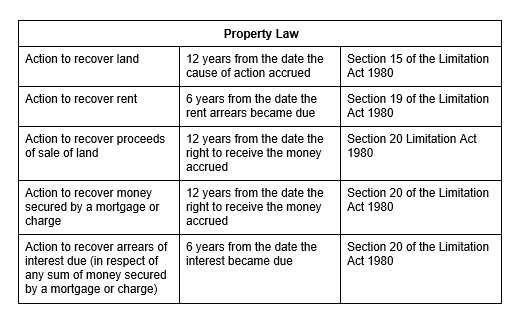
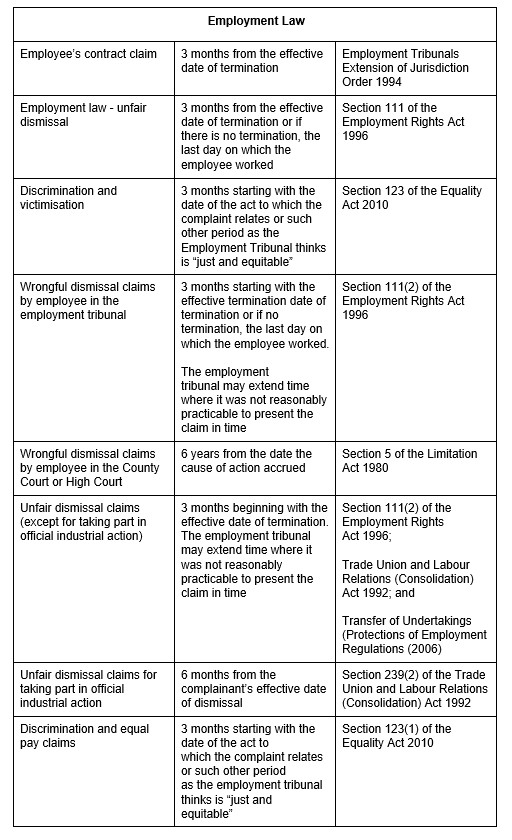
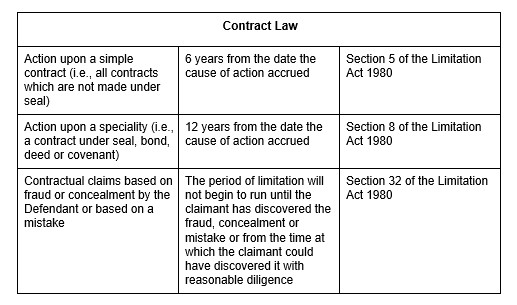

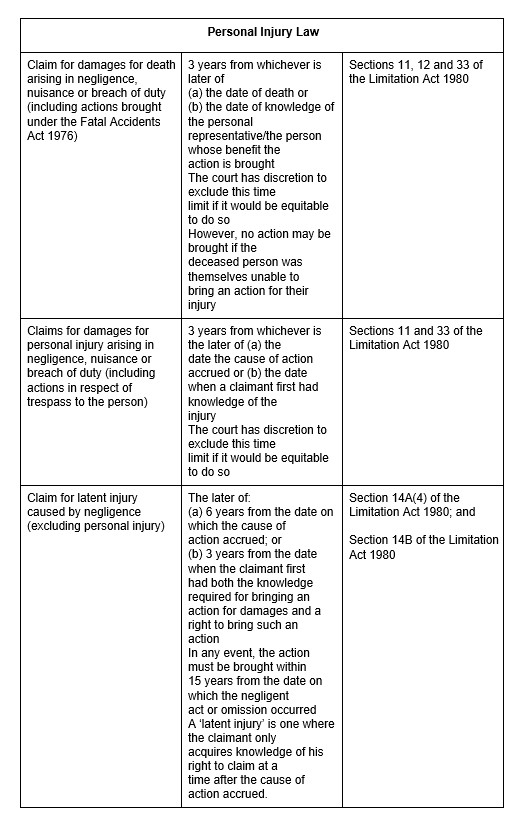
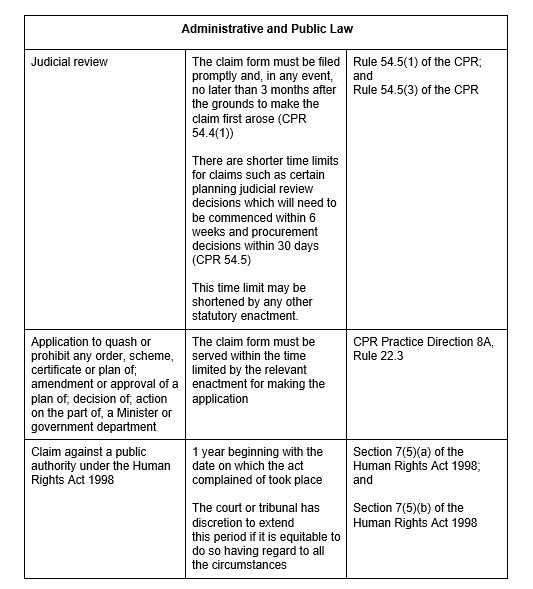
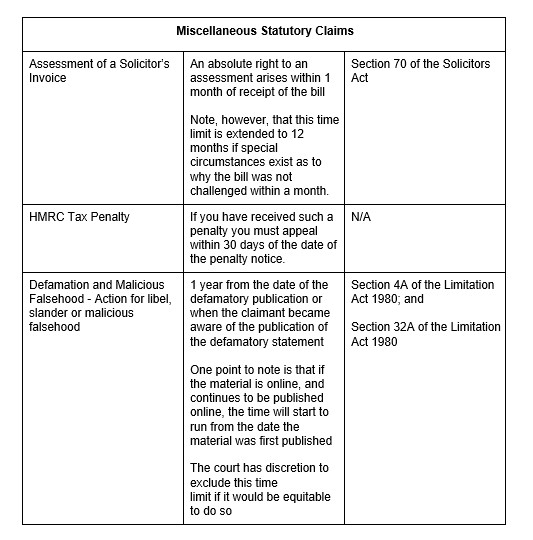
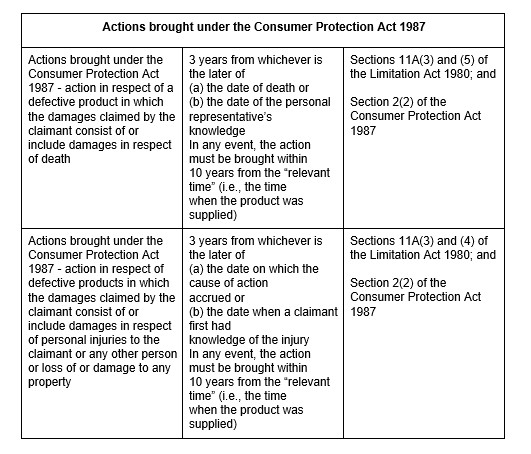
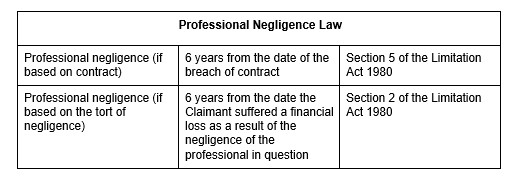

What do you need to do (as the claimant) by the limitation date?
As the claimant, you need to have ‘brought an action’ (i.e., commenced legal proceedings). Put simply, the court needs to have issued a claim form at your request. The process is as follows, by way of example:
- the claimant delivers a claim form to the court (either physically or electronically);
- the claimant pays the issue fee (which can be up to £10,000); and
- the court seals and ‘issues’ the claim form.
An action is usually deemed ‘brought’ on the issue date endorsed on the claim form by the court. However, where there is a delay between the court receiving the claim form from the claimant, and the court issuing that claim form, for the purposes of limitation, proceedings are ‘brought’ when the claim form was received by the court office.
If you are really pushed for time and are right up close to the limitation deadline, it may be necessary to issue a claim form as a matter of urgency to ‘stop the clock’. Once this has been done, you can consider the next steps. It could be that pre-action steps now need to be complied with, or the particulars of claim must be drafted. Usually, these are done prior to issuing the claim but obviously it would not be possible to comply with all of the pre-action steps if the limitation period deadline is looming. Therefore, the claimant can commence proceedings and then seek an immediate stay to allow the pre-action steps to be followed accurately.
It is important to consider the following issues:
- the court fee for issuing a claim form can be expensive (up to £10,000 (this top-band fee applies to claims worth £200,000 or more));
- a claim form needs only to outline brief details of the claim (with the full particulars of claim to follow separately). Therefore, the claimant must be clear prior to commencing proceedings that they do indeed have a claim and that, at the very least, they know who it is against. If substantial alterations are required to be made to the claim form it may then amount to a new claim which would jeopardise the whole point of getting the claim form issued urgently (and give rise to a limitation defence by the opponent); and
- costs awards can be made by the court once proceedings have been issued. Thus, the claimant could be responsible for paying their opponent’s costs from that point forward.
What happens if a solicitor does not advise about any limitation periods and this has prejudiced my case?
It is imperative that solicitors, barristers and other professional advisors consider the limitation issues as soon as being instructed in a matter so as to prevent any possibility of a claim being time-barred which would be disastrous for you.
If any such professional has failed to advise you as to limitation time limits and this has prejudiced your potential claim, then it may be possible to recover any losses in a claim for professional negligence against the firm or individual providing the advice. We can assess the prospects of your case and advise you accordingly.
Please see how we can help you here.
How we can help
As always, we can offer you a no-cost, no-obligation introductory 20-minute call to discuss your litigation matter, and we can answer any questions or queries you have in relation to limitation periods which may be relevant to your matter. Please do get in touch with us so that we can discuss your matter and utilise our expertise to steer you to the most suitable outcome.
